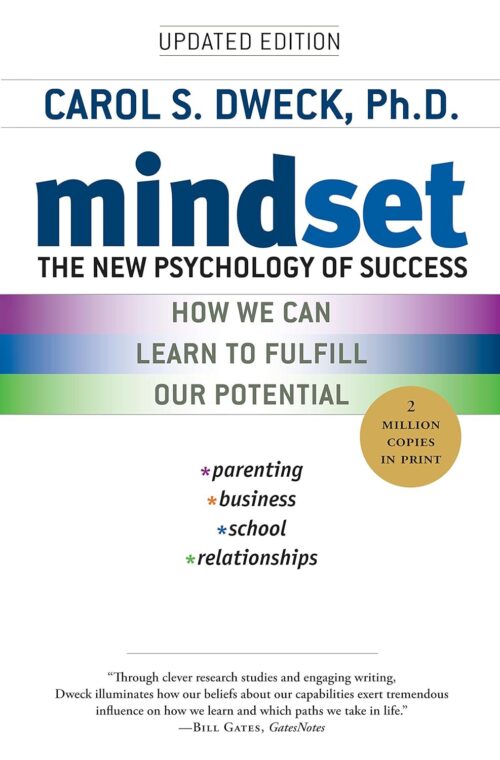Carol Dweck's Growth Mindset Theory

In today’s dynamic and ever-changing world, the concept of success is undergoing a profound transformation.
At the forefront of this shift is the pioneering work of psychologist Carol Dweck and her groundbreaking theory of the Growth Mindset.
The Power of the Mindset
Success, in both personal and professional spheres, has long been a subject of fascination and pursuit. For decades, scholars, leaders, and individuals alike have sought to understand the underlying principles that drive achievement and excellence. Carol Dweck, a renowned psychologist and professor at Stanford University, has made a substantial contribution to this discourse with her theory of the “growth mindset.”
In this article, I will explore the life and work of Carol Dweck, examine the fundamental tenets of the growth mindset theory, dissect the four key ingredients that fuel its transformative power, and consider the ongoing relevance of Dweck’s groundbreaking insights.
Who is Carol Dweck?
Before we dive into the depths of her theory, it’s essential to understand the person behind it. Carol S. Dweck is a distinguished psychologist known for her extensive research on motivation, achievement, and personality.
She was born on October 17, 1946, in New York City, and her academic journey has been nothing short of remarkable.
Early Life and Academic Journey
Carol Dweck’s academic path was marked by a relentless curiosity about human potential. She completed her undergraduate studies at Barnard College and then pursued her Ph.D. in psychology at Yale University, under the guidance of renowned psychologist Donald T. Campbell. Her early work focused on the intersection of achievement and self-conceptions, foreshadowing the groundbreaking research she would later undertake.
The Birth of the Growth Mindset

Dweck’s fascination with achievement and success led her to conduct extensive research on the beliefs people hold about their abilities and intelligence. Through years of empirical investigation, she crystallized her findings into the concept of mindset, which she introduced to the world in her influential book, “Mindset: The New Psychology of Success” published in 2006.
Carol Dweck’s Theory
Central to Carol Dweck’s work is the concept of mindset—a belief system that shapes how individuals perceive themselves and their potential. Dweck identifies two primary mindsets that profoundly impact one’s approach to learning, challenges, and ultimately, success:
- Fixed Mindset: Individuals with a fixed mindset perceive their abilities, intelligence, and talents as innate traits, unchangeable and predetermined. They tend to avoid challenges, fearing failure, and often view effort as futile because they believe that success is primarily determined by their inherent abilities.
- Growth Mindset: In stark contrast, individuals with a growth mindset believe that their abilities and intelligence can be developed and enhanced through dedication, learning, and perseverance. They embrace challenges as opportunities to learn, persist in the face of setbacks, and see effort as the path to mastery and success.
Dweck’s groundbreaking theory has profound implications for individuals, organizations, and society as a whole. It challenges the conventional wisdom that talent alone determines success and posits that one’s beliefs about their abilities are equally—if not more—significant.
The Four Key Ingredients to a Growth Mindset
The growth mindset is not merely an abstract concept; it is a practical framework that can be cultivated and applied to drive personal and professional excellence.
To harness the transformative power of the growth mindset, one must understand its four key ingredients:
- Ingredient 1: Embracing Challenges Individuals with a growth mindset see challenges as opportunities for growth and learning. They willingly step outside their comfort zones, tackle new and difficult tasks, and view difficulties as chances to improve. In the business world, this translates to a workforce that welcomes innovation, adapts to change, and constantly seeks ways to elevate performance.
- Ingredient 2: Persisting in the Face of Setbacks Resilience is a hallmark of the growth mindset. Instead of succumbing to failure or adversity, those with a growth mindset persevere. They understand that setbacks are not indicators of their inherent inadequacy but rather part of the learning process. In organizations, this resilience fosters a culture of determination, where employees bounce back stronger from setbacks, driving progress and innovation.
- Ingredient 3: Effort as the Path to Mastery Effort is seen as a necessary and fulfilling part of the journey toward mastery in a growth mindset. Individuals are willing to invest the time and energy required to achieve their goals. In the corporate world, this translates to a workforce that is committed to continuous improvement, striving for excellence in every task and project.
- Ingredient 4: Learning from Criticism Constructive feedback and criticism are embraced by individuals with a growth mindset. They see feedback as a valuable tool for personal and professional growth, understanding that it can help them become better at what they do. Within organizations, this attitude fosters a culture of feedback, where employees actively seek and provide input, leading to improved performance and innovation.
Carol Dweck’s Ongoing Work
As of my last knowledge update in September 2021, Carol Dweck continued her work as a professor at Stanford University, where she actively researched and promoted the concept of the growth mindset. However, her influence extended far beyond the walls of academia. Dweck’s theory had found its way into schools, boardrooms, and leadership development programs, sparking a movement towards a more adaptive and resilient approach to learning and achievement.
Beliefs of a Growth Mindset
At the core of the growth mindset are beliefs that drive individuals to reach their fullest potential. These beliefs include:
- Belief 1: Potential for Development Individuals with a growth mindset believe that their abilities and intelligence are not fixed but can be developed with dedication and effort. This belief is the foundation upon which the growth mindset is built.
- Belief 2: Embracing Challenges A growth mindset involves viewing challenges as opportunities for growth and learning. This belief encourages individuals to seek out new and challenging experiences, pushing the boundaries of their capabilities.
- Belief 3: Persistence Persistence is a natural outgrowth of the growth mindset. Those who embrace this mindset understand that setbacks are part of the learning journey and are willing to persevere, continually striving for improvement.
- Belief 4: Effort Effort is celebrated in the world of the growth mindset. It is seen as the path to mastery and success, a testament to one’s commitment to personal and professional development.
- Belief 5: Learning from Feedback Constructive feedback and criticism are welcomed with open arms by individuals with a growth mindset. They understand that feedback is an invaluable tool for self-improvement, leading to higher levels of achievement.
Application in the Business World
The growth mindset isn’t limited to personal development; it has significant implications for organizations and the business world.
Companies that actively promote and cultivate a growth mindset among their employees can reap numerous benefits, including:
Enhanced Innovation: A growth mindset encourages employees to think creatively, take risks, and explore new ideas, fostering innovation and adaptability.
Improved Resilience: In a rapidly changing business landscape, organizations with a growth mindset culture are better equipped to bounce back from setbacks and thrive in adversity.
Increased Employee Engagement: When employees believe in their ability to grow and develop, they are more engaged and motivated in their work, leading to higher productivity and job satisfaction.
Effective Leadership: Leaders with a growth mindset are more likely to inspire and empower their teams, creating an environment where individuals are encouraged to excel.
Most popular:
Most Recent:
-
 Bubble: The Little Mermaid fairy tale in a post-apocalyptic setting
Bubble: The Little Mermaid fairy tale in a post-apocalyptic setting -
 10 Best AI Video Generators
10 Best AI Video Generators -
 Apple: The Company that Revolutionized the World of Computing
Apple: The Company that Revolutionized the World of Computing -
 10 Best Books on Artificial Intelligence (AI) to read
10 Best Books on Artificial Intelligence (AI) to read -
 Italy: 10 Unmissable Places for an Unforgettable Journey
Italy: 10 Unmissable Places for an Unforgettable Journey -
 Rediscovering Spontaneity: Why I Stopped Tracking My Habits
Rediscovering Spontaneity: Why I Stopped Tracking My Habits
Cultivating a Growth Mindset
Cultivating a growth mindset is not a one-time endeavor; it requires ongoing effort and commitment. Whether you are an individual seeking personal growth or an organization striving for excellence, here are actionable strategies to foster a growth mindset:
Individual Strategies:
Self-awareness: Reflect on your beliefs about your abilities and actively work to shift from a fixed to a growth mindset.
Embrace challenges: Seek out opportunities that push your boundaries and encourage learning.
Resilience: View setbacks as opportunities for growth and persistence as a means to achieve your goals.
Continuous learning: Develop a thirst for knowledge and actively seek opportunities for self-improvement.
Feedback: Welcome constructive criticism as a tool for personal growth and actively seek feedback from peers and mentors.
Organizational Strategies:
Leadership commitment: Leaders must model a growth mindset and communicate its importance to the organization.
Training and development: Invest in training programs that promote a growth mindset among employees at all levels.
Feedback culture: Foster a culture where feedback is encouraged, and employees feel safe providing and receiving feedback.
Innovation initiatives: Create opportunities for employees to work on innovative projects that challenge their skills and encourage creativity.
Recognition and reward: Acknowledge and reward employees who demonstrate a growth mindset and achieve significant personal or professional growth.
Conclusion
Carol Dweck’s theory of the growth mindset has ushered in a new era of understanding and achieving success. By challenging the long-held belief that talent alone determines our capabilities, Dweck has provided a roadmap for individuals and organizations to reach their full potential. As we continue to navigate an ever-evolving world, the growth mindset remains a powerful tool for adapting, learning, and excelling in all aspects of life.
Whether you are a student, a professional, or a leader, embracing the growth mindset can pave the way for unprecedented personal and organizational growth.
As we look ahead, it is essential to stay informed about the latest developments in Dweck’s work and the continued impact of the growth mindset theory.
In closing, the growth mindset is not merely a theory; it is a philosophy that empowers individuals and organizations to unlock their potential, embrace challenges, persevere through setbacks, and ultimately, achieve excellence.
It is a transformative concept that has the potential to shape the future of success for generations to come.



